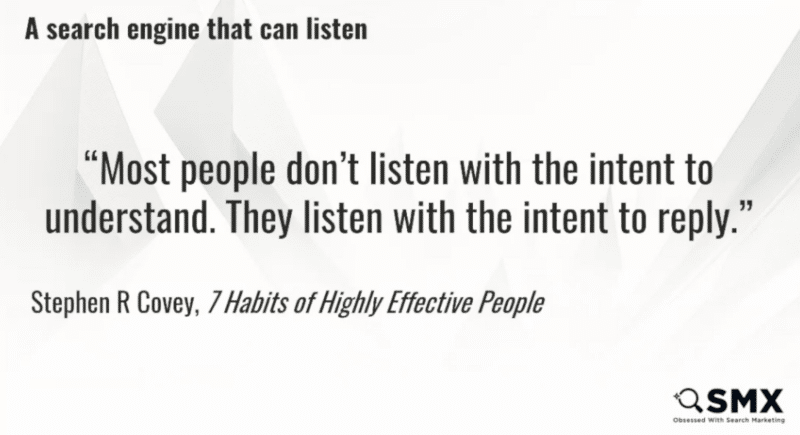
Artificial intelligence (AI) is revolutionizing consumer engagement and transforming the landscape of search, according to James Murray of Microsoft Advertising, who spoke at SMX Advanced.
Here are the key points he raised in his presentation, exploring the paradigm shift in search technology and its implications for advertisers and marketers.
The expanded search box: A gateway to nuanced queries
Murray highlighted a seemingly small but significant change in search: the expansion of the search box:
- “What have we done or what has changed? Well, a lot has changed. In fact, we think that we have completely shifted the paradigm of what search means and what is possible with search.
- “And I’d say one of the biggest and most fundamental changes through AI is that we’ve changed search from this to this. We’ve made the box bigger.”
From:

To:

This physical enlargement represents a fundamental shift in how users can interact with search engines.
No longer confined to short keyword phrases, users can now express complex, nuanced queries that more accurately reflect their true intentions.

For example, instead of searching for “cheap holiday Rome,” users can now input detailed requests like:
“Could you provide a Rome weekend itinerary for a family of 2 adults and 2 children aged 6 and 4. We want a mix of historical culture and fun activities, and the kids want to eat as much pizza as possible.”
This level of detail allows AI-powered search engines like Microsoft’s Copilot to understand context and provide more relevant, comprehensive responses.
Murray said:
- “Up until very recently, it has just not been possible in the sense that whilst we have always had the capability to put in these very large, very nuanced searches, the results that we get would often be confused or or just unintelligible.
- “Now, we’re in a situation where search through AI, through these new conversational capabilities, can actually not only understand a very complex query but can give us a meaningful reply that actually answers what we’re looking for.
- “So this is an example within the Microsoft ecosystem of Copilot. And so you can see that it has taken what I’ve given it, and it’s actually started to put together an itinerary, going to the Colosseum, going to see various bits of what Rome has to offer.”

AI’s Impact on search capabilities
Murray then explored the key advancement of integration of AI into search:
- Synthesis and summarization: AI can quickly process and synthesize information from multiple sources, providing concise, relevant answers to complex queries.

Murray explained:
- “If we look at that example which I just gave (trip to Rome), we start with this very dense, rich and sort of multifaceted, query on the left.
- “Copilot is able to simulate all of that information. But in the background, this would have taken us previously, in normal search, multiple iterations, multiple searches (see right) to pull together that same information. Whether it’s looking for family activities or what to see, history tours, the best place to get pizza in Rome, and so on.
- “And so what we’re seeing is, that from a consumer perspective, this does a number of things.
- “One is that it enables people to say what’s on their mind, but it enables them to get to answers quicker.”
Understanding true intent
AI-powered search engines aim to understand the underlying question behind a query, going beyond literal interpretation to grasp context and user intent.

Current search engines often provide broad, surface-level answers, but struggle to understand the deeper intent behind user queries.
For example, when someone searches for “Cancun weather in March,” the real underlying question might be about what to pack for a trip.
Murray said that search engines should evolve to better grasp and address the true, more nuanced intent behind users’ searches, rather than just offering basic information and related suggestions:
- “Wouldn’t it just be easier if we could say, ‘can you just pack, and make me a packing list and organize it by which room in the house I’m most likely to find those items?’
- “And to showcase how that can come to life and the reality of how we can get to the underlying question where we don’t have to read between the lines anymore because when people can actually ask what’s truly on their mind, and we can give them a sensible answer.
- “It allows that freedom to be able to most relevantly match to what people are actually asking for.

- “And so, really, what we’re seeing is this evolution of people being freed to ask the questions that they’ve always wanted to but, you know, perhaps haven’t felt comfortable of being able to do and the search engines being able to respond with much deeper, and much more nuanced and relevant answers.”
Evolution of AI search usage
Murray outlined three stages in the adoption of AI search tools:

- Initial curiosity (2023): Users explored the capabilities of AI tools, testing their limits and discovering new opportunities.
- Knowledge and action: As users became more familiar with AI tools, they began to find new use cases and develop greater proficiency.
- AI in action (2024 and beyond): Users are becoming increasingly comfortable with AI tools and are extracting tangible value from them in their daily lives and work.
New possibilities for users and marketers
He then took us on the journey of how the advent of AI-powered search has opened up new avenues for users and marketers:
Expanded capabilities
Users can now perform tasks that were previously impossible or time-consuming, such as generating content, analyzing data and writing code.

- “Looking at the yellow bars here, we’re also seeing an incredible amount of new things that just previously weren’t possible.
- “So, coming up with new ideas and inspiration, summarizing content, which we’ve just seen, being able to actually generate, write and draft content. But not only that, analyzing data and writing code.
- “Actually, the list of these capabilities is expanding all the time. And we talked about that idea of value as we’ve moved from knowledge to action as the prompts that we put into some of these conversational experiences and the generative AI tools are getting more precise, we’re getting to faster task completion, and people are really starting to extract value.”
Increased efficiency
Studies show that users can complete tasks and reach decisions up to 50% faster using AI-powered search compared to traditional search methods.

- “Because we’re seeing that we’re able to ask those more complex questions, more nuanced questions, and we’re able to get to the answers quicker, what we [Microsoft] found is that on average, users take about half the time to reach a decision on Copilot compared to traditional search, and this matches up with other, tools as well.”
These are driving forward new ways of thinking and more efficient ways of being able to, you know, use engines for what we need them to do, which is ultimately get to the answers that I need, get that relevant information.
Enhanced advertising opportunities
Marketers can leverage these new search capabilities to create more targeted, relevant ad experiences for users in several ways.
- Ads have already been incorporated in AI Search: Because of AI tools rapidly growing in importance, the search tools are already AI powered.
Ads were built into the Copilot experience from day 1. Murray said if you’re optimizing for your core search experience, you’re also optimizing at the same time for the Copilot experience.
- Best Practices: Advertisers should focus on creativity, especially visually speaking ads, image extensions, product feeds and multimedia ad formats to improve click-through rates.

What Microsoft are doing is taking the same ad creatives and content that advertisers create for search, and are replicating them within the conversational experience as well.
Murray highlighted the searcher has been transformed to deeper, more rich, engaging, conversations.
The more that advertisers can make ads visual, whether that’s using image extensions or some of the product feeds, or, new sort of formats like multimedia ads.
The more visual you can make them, the more they will likely stand out and then, the better they’re likely to get in terms of your click through rate.
Examples of marketers leveraging AI
- Content simplification: AI is regularly used for rewriting complex product summaries for easier understanding. It also useful for simplifying technical information from engineers.
- Tone adjustment: AI can help change the tone of ad copy to make it more approachable making serious content about cat trees more playful and fun. AI can generate multiple headline options, showcasing an understanding of context and even wordplay (e.g., cat puns).
- Strategic analysis: Marketers can input their brand and competitors into Copilot, to get insights. AI can then perform complex tasks like SWOT analysis. This saves time and provides external perspectives on strengths and weaknesses.
- Inclusive advertising: AI can help create more inclusive ad strategies such as analyzing customer challenges in car insurance. AI can suggest adjectives to address specific customer concerns and create a sense of safety.

Implications for marketers
Murray highlighted three key implications for marketers in this new AI-driven search landscape:
1. Quality and visibility
Ensuring high-quality, crawlable content is crucial for visibility in AI-powered search results. Tools like IndexNow can help keep content fresh and discoverable.
Murray suggests “revisiting and thinking about your SEO strategy, making sure that all of your content is crawlable.”
2. Hyper-personalization
The detailed nature of AI search queries allows for unprecedented levels of personalization in ad targeting and content delivery.
Murray clarifies here that this isn’t a result of data collection, saying that being able to be detailed with answering questions is “not because we are being invasive in terms of how much data we can stack and track on what people are, doing and and the demographics of who they are.”
- “This is simply by giving people the opportunity to explain what it is that they really want in detail. Through that conversation, the richer signals that we’re able to get, the sort of depth that we are able to understand means that when we serve an ad, it is absolutely the right ad at the right moment for the right person.”
3. Creativity and efficiency
AI tools can assist marketers in various tasks, from writing headlines to conducting SWOT analysis, fostering creativity and improving efficiency. It can even “showcase some blind spots that you might have in your creative campaign,” Murray said.
The future: Multimodal AI
Looking ahead, Murray touched on the concept of multimodal AI, which can process and generate content across various formats (text, image, video, audio).
This advancement promises even more exciting possibilities for search and content creation.
- “Where we’re moving to is where we can have any output from any input,” Murray said.
He shared an example – a picture of a rocket launch. By feeding just the image and asking AI about it, AI was able to tell us the specific event depicted in the image.

Unlock new levels of creativity, efficiency and productivity
The evolution of search in the age of AI represents a significant shift in how users interact with information and how marketers can reach their audience.
Murray encourage us to notice the small things and, quoting Liz Vassey (an American actress):
- “The rewards are inversely proportional.”
from Search Engine Land https://ift.tt/TIAlVW8
via IFTTT
No comments:
Post a Comment